- Home
- News
- Recent News
- ResilientMass Summit Sparks Call for Collaboration on Climate Resilience
ResilientMass Summit Sparks Call for Local, Global Collaboration on Climate Resilience
A diverse coalition of state officials, mayors, Indigenous and community leaders, researchers, philanthropists, and entrepreneurs gathered at UMass Boston on March 27 for the ResilientMass Summit, where they engaged in crucial discussions about the significant impacts of climate change on our communities and shared innovative strategies around efforts to build resilience.
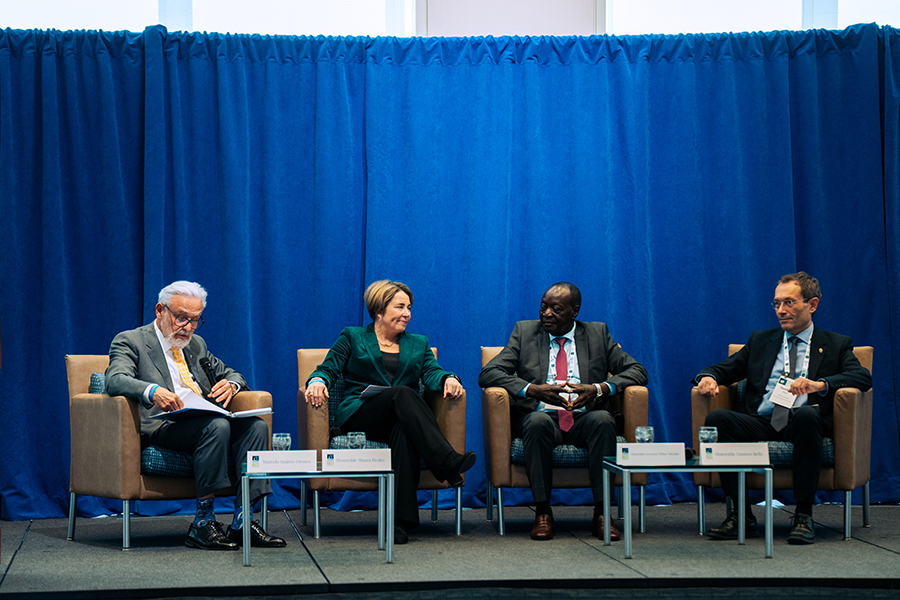
The ResilientMass Summit highlighted the need for collective action, with Governor Maura Healey, Boston Mayor Michelle Wu, and other influential figures driving home the message: Climate resilience is a global challenge that demands local action.
The summit builds on the efforts launched at the Vatican's climate summit, From Climate Crisis to Climate Resilience, hosted in May 2024 by Pope Francis, with the goal of catalyzing a global movement focused on protecting all citizens from the climate crisis.
“The ResilientMass Summit offered us an opportunity to expand the ways we think about climate resilience strategy and share best practices. And in doing so, we see how, through rigorous research, analysis, and planning, we can make them better practices,” said UMass Boston Chancellor Marcelo Suárez-Orozco.
The summit is a launching pad for ten global regional summits scheduled for 2025, sponsored by the Pontifical Academy of Sciences and the Pontifical Academy of Social Sciences. Chancellor Suárez-Orozco and Dr. Ram Ramanathan, professor Emeritus at the Scripps Institution of Oceanography at the University of California, San Diego, are leading the regional summits alongside dedicated task forces from the two Academies, as well as local scientists and leaders from each of the ten regions across Africa, Asia, Australia and the South Pacific, Europe, North America, and South America.
“In California last month, here in Massachusetts today, and later this year at eight additional summits – in Vienna, China, Japan, India, Australia, Kenya, Italy, and Brazil – governors, mayors, scientists, and civil society actors will convene and chart pathways toward a healed, sustainable, and more humane future,” Chancellor Suárez-Orozco said.
Watch the summit panels, keynote addresses and opening remarks.
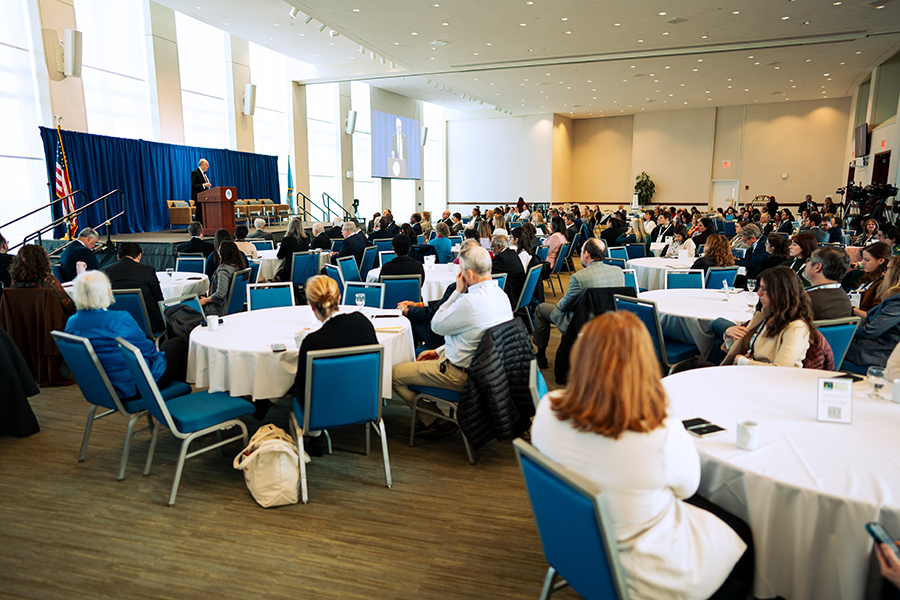
Joachim von Braun, president of the Pontifical Academy of Sciences, emphasized the critical role of global scientific collaboration in tackling the climate crisis.
"Science is the main source of truth and thereby building trust. Truth is a function of trust, and science plays a key role. We must stand for truth in the science world and in public policy,” he said.
UMass President Martin T. Meehan outlined the university’s role in fostering actionable climate solutions.
“At a time when some want to drag us backward into the past and anchor us to the old and outdated ways of doing things, Massachusetts is doing what it has always done—working together in leading the way forward. At every UMass campus, you'll find examples of how the University of Massachusetts is doing that,” Meehan said. “Here at UMass Boston, you only need to look around the room today to see what we're doing—serving as a convener on climate resiliency and through its Stone Living Lab, researching nature-based resiliency strategies."
Cardinal Peter Turkson, chancellor of the Pontifical Academy of Sciences & Social Sciences, offered a reflection on the moral imperative to act on climate resilience, calling for a global movement rooted in compassion and justice.
“Climate disasters or climate crisis remind us of … the words of Pope Francis that a crisis is almost always a forgetting of a way of life and the way forward comes through recalling our roots and recovering our values and return to what is authentically worthwhile,” Cardinal Turkson said.
The Massachusetts summit advances the work of the ResilientMass Plan, unveiled by Governor Healey’s administration in 2023, an international model that mayors and governors from around the world cited as a best practice planning strategy during the Vatican summit last May. Discussion focused on the MAST strategy, articulated in the Planetary Call to Action for Climate Change Resilience, which emphasizes Mitigation, Adaptation, and Societal Transformation.
Governor Healey and Mayor Wu Deliver Impactful Keynotes
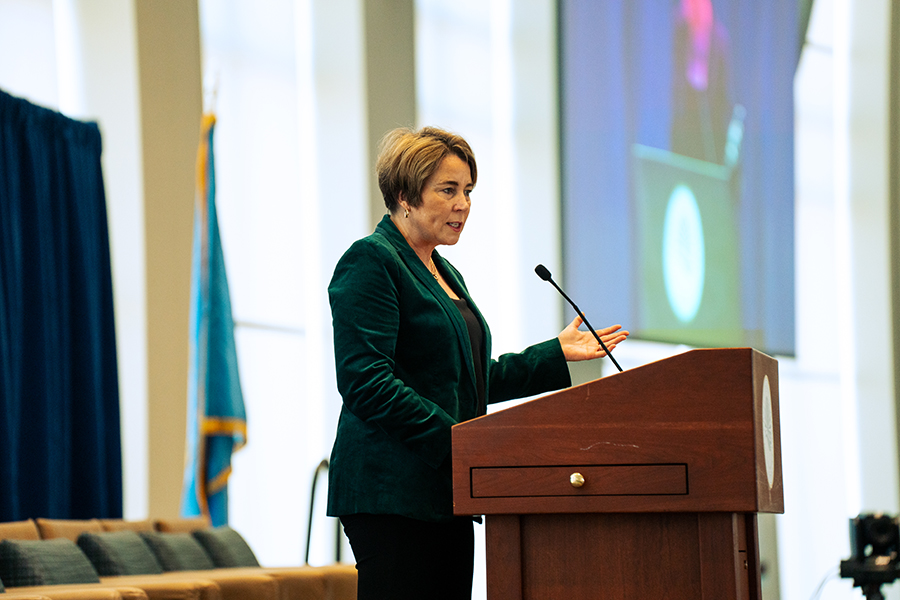
Governor Healey emphasized Massachusetts' strong commitment to climate resilience, highlighting the state's ResilientMass Plan, which includes over 100 action items across sectors and a $1 billion investment in climate technology. Healey also pointed to successful partnerships with local communities and Indigenous groups, as well as the state’s focus on improving infrastructure, including $200 million for flood protection upgrades.
Despite federal challenges, Massachusetts remains dedicated to advancing climate action through innovation, collaboration, and inclusivity, she said.
“It’s about how we move forward, how we build strong action-oriented partnerships with local communities to keep innovating, to continue to put state resources into this, to continue to support local voices who often know the best solution and the best path,” Healey said. “And I promise you that Massachusetts will continue to contribute our ideas, our values, and our collective muscle and effort to this important initiative—this initiative to building a more resilient and hopeful world.”

Mayor Wu highlighted Boston's proactive climate initiatives, emphasizing the importance of addressing climate change to ensure a sustainable future for the next generation. Drawing from her personal experiences as a mother, she stressed the need for protecting nature and fostering children's connection to the environment.
She pointed to Boston's achievements, such as being the first U.S. city to implement a Net Zero Carbon Zoning ordinance and investing in resilience infrastructure like green roofs and flood control. Additionally, she underscored the city’s efforts to create green jobs and improve air quality through initiatives like the $150 million Boston Energy Saver program. Wu called for a collective, collaborative approach to climate resilience, acknowledging the global leadership of figures like Pope Francis and emphasizing the need for unified action across all levels of society.
“Climate resilience is collaboration,” Wu said. “Every family and resident, every public official and private partner, every single one of us needs to be ready to roll up our sleeves and pitch in to protect all of us.”
Panels Discuss Local Solutions, Finance, Innovation, and Global Collaboration
The summit panels underscored the importance of partnerships—among governments, local communities, businesses, and scientists—to drive meaningful climate action.
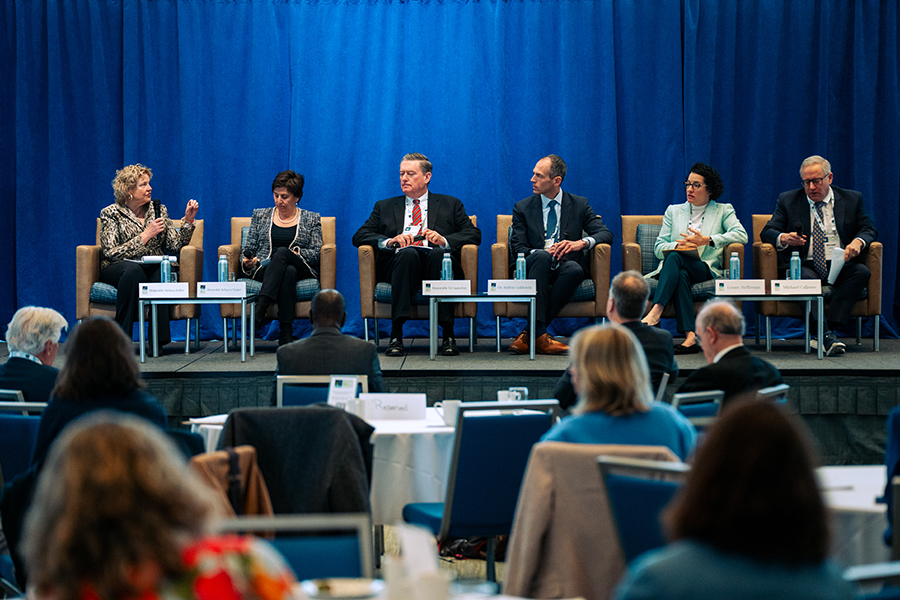
In the first panel, moderated by Massachusetts Climate Chief Melissa Hoffer, experts discussed the state's approach to resilience across various government sectors. Panelists explored Massachusetts' focus on environmental justice and the integration of scientific data into climate adaptation strategies. They emphasized the importance of protecting vulnerable communities and ensuring that the state’s resilience efforts center on equity and justice. The discussion showcased the interconnectedness of government, business, and local leaders working together toward a common goal of creating resilient communities.
“Responding to the climate crisis is part of who we are; it is embedded into the work that we do. … That will not change no matter what happens at the federal level, no matter how much money is pulled from us. We're just going to have to be more creative, more strategic,” said Commissioner of the Department of Public Health Robbie Goldstein.
Gina McCarthy, former White House National Climate Advisor, moderated the second panel, where experts discussed the innovative finance mechanisms necessary to fund climate resilience. Panelists presented various strategies for securing public and private funding for resiliency projects, highlighting the importance of long-term investments in infrastructure. They stressed that climate resilience must be viewed as an investment rather than a cost, with returns that will fuel further action. The panel emphasized the need for collaboration between private capital and government entities to build a more resilient future.
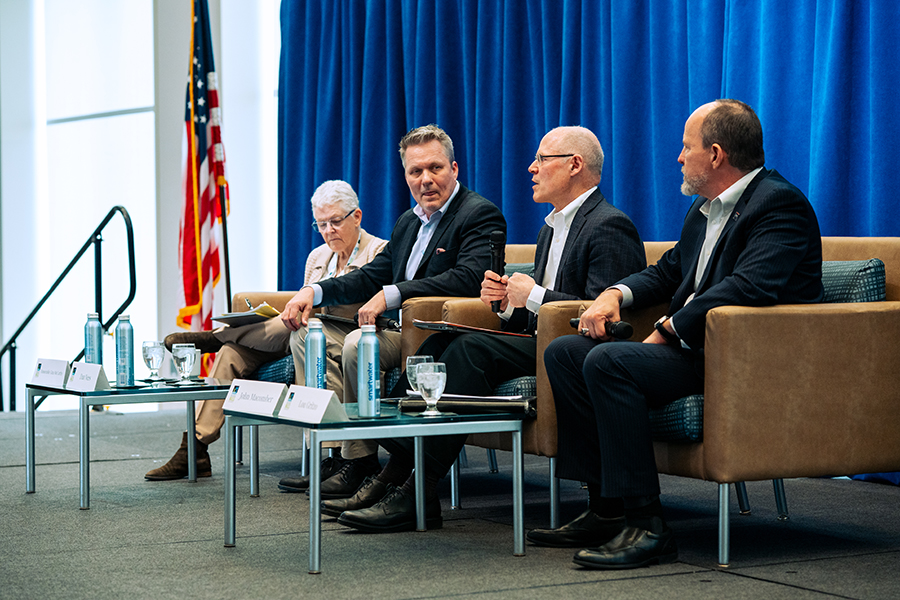
“I know my world has mostly been the public sector, but the more and more I look at the ways in which the public and private sectors can work together, the more I actually am hopeful that there is a future for my kids and my grandkids,” McCarthy said. “So let's keep plugging, let's keep looking at these opportunities, let's keep driving them. You know Massachusetts was the start of revolution in this country. We need to still be the driver of that revolution.”
Kim Driscoll, lieutenant governor of Massachusetts, moderated the third panel, which explored innovative climate resilience solutions implemented in cities across Massachusetts. Panelists shared their experiences in Cambridge, Lowell, and Boston, where they’ve implemented creative solutions like green roofs, tree planting, and flood control measures. The panel highlighted how these local solutions can be scaled to help other urban areas build resilience against climate impacts.
“An environment department or a mayor's office unit is not going to accomplish these things alone, and I'd say some of the biggest accomplishments of the Wu administration on climate—I am very proud to say—have been from our public housing agency or our housing office our office of emergency management,” said Oliver Sellers-Garcia, Boston’s Green New Deal director. “I run the environment department, but I am delighted when the climate announcement comes from a different department, and that I think is one of the most important things that I would say.… You can be more of a catalyst for what others do than necessarily have to put the burden all on yourself.”
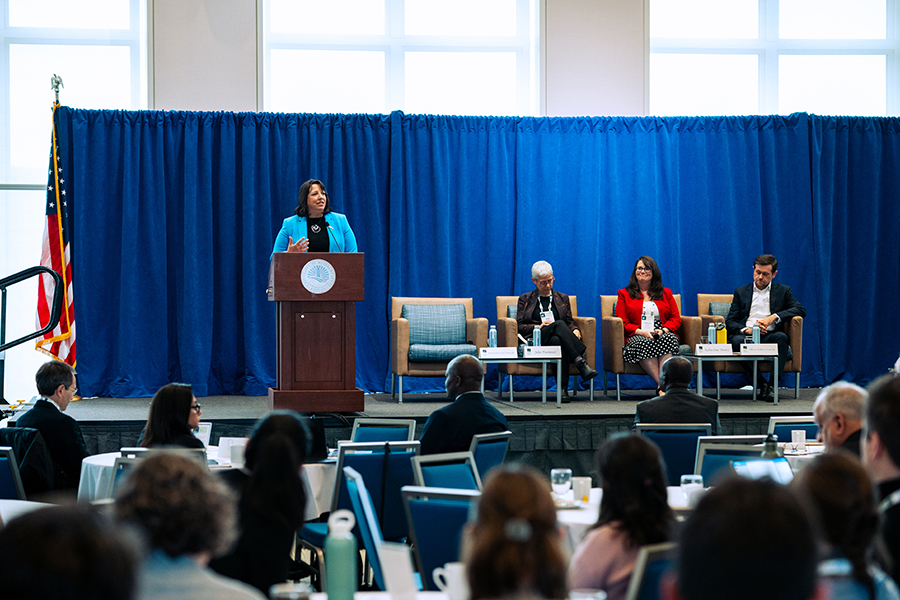
The afternoon session featured a fireside chat moderated by Chancellor Suárez-Orozco with Governor Maura Healey, Governor Wilbur Ottichilo of Vihiga County, Kenya, and Gustavo Beliz of Argentina. The discussion focused on the importance of local climate actions in the context of global challenges. The leaders shared their countries' experiences and reflected on how local actions can drive global change, emphasizing that climate resilience requires collaboration at every level—from grassroots efforts to international partnerships.
“I have a big dream that when we meet finally at the Vatican God willing next year, we will have gathered enough information and evidence from all these summits,” Governor Ottichilo said. “I believe that meeting will be a defining moment when we should come out with a clear document that will give a vision on how to move forward to address the issue of climate change as an issue that is affecting directly mankind.”
Breakout Sessions Cover Range of Climate Resilience Topics
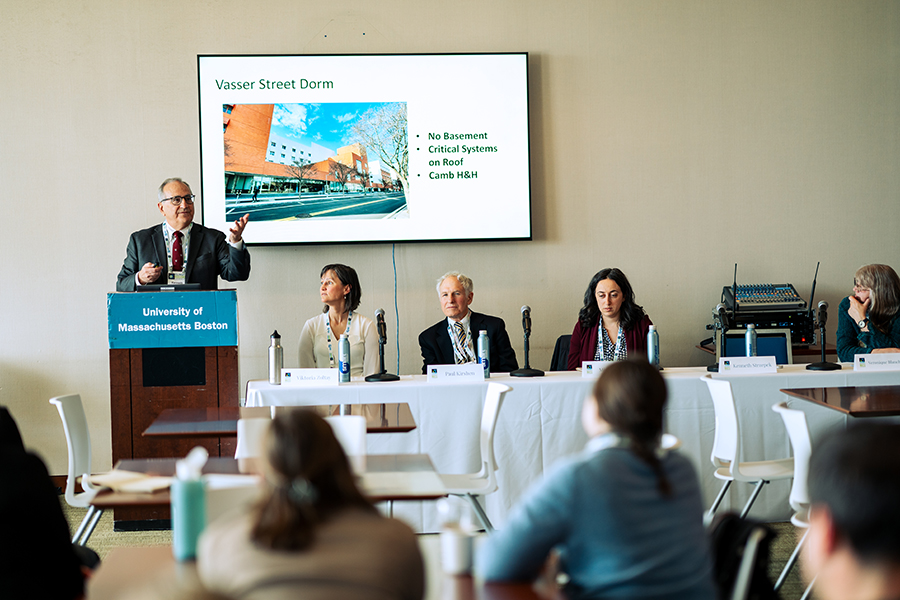
The breakout sessions held in the afternoon focused on a range of climate resilience topics. The Coastal Resilience panel, moderated by Stephanie Cooper, featured experts discussing the engineering and biological approaches to mitigating coastal risks. The Climate and Health session, led by Dr. Bisola Ojikutu, explored the intersection of public health and climate change, emphasizing the need for sustainable healthcare practices. In the Inland Flooding and Resilience panel, moderated by Viktoria Zoltay, experts delved into strategies for combating flooding and enhancing resilience in inland communities. Meanwhile, the Nature-Based Solutions session, led by Katie Dafforn, examined eco-friendly interventions to address climate impacts on urban environments. The Lessons Learned from Recent Weather Disasters panel, led by Carola Suárez-Orozco, focused on insights from past weather-related events and the importance of preparedness and resilience.
In the second round of breakout panels, the Resilience Playbook for Cities and Towns session, moderated by Katherine Antos, outlined actionable strategies for local governments to enhance climate resilience. The Climate-Ready Workforce panel, led by Kirstin Hill, emphasized the need for workforce development in green technologies and sustainable practices. The Voices of Youth session, moderated by Dean Tara Parker, highlighted the perspectives of young leaders and nature education in driving climate action. The Indigenous Stewardship and Climate Resilience panel, led by María Belén Power, discussed the critical role of Indigenous knowledge in building climate resilience. Finally, the Resilience and Adaptation Innovation Tech Showcase, moderated by Katie MacDonald, provided a platform for climate tech companies to present cutting-edge solutions for climate challenges.
